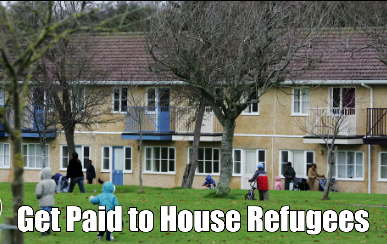
Australia, along with well over a hundred countries, has been grappling with the politics of housing and settling refugees who are in search of safety and a new start in life. What you didn’t know, is that Australians themselves can now help and get paid for it. Imagine hosting a refugee in your home – not only are you supporting someone who is displaced, but you’re also taking part in what could be a deeply enriching cultural experience/’Australian experience’.
If you’re not too sure whether this is something you wish to look deeper into, then you have flown into the right article. In this read, I will take you through the steps of how to actually get started, the pros and cons of such a move, and even share some personal accounts of Australians that have been generous enough to share their homes.
What Does “Getting Paid to House Refugees” Mean?
You don’t think of hosting refugees as a money-making venture, but rather as solving a humanitarian problem and getting compensated for it. Some initiatives offer subsidies for food, pay utilities in addition to rent, and provide you a much kinder, safer, and welcoming place to stay.
Individuals or groups, both in the private and non-profit sectors, assist those who suffered from war, natural calamities, or were politically oppressed to find a home in Australia through ‘Humanitarian Settlement Services’. There’s a gap between the willingness of people from developed nations to assist poor communities, and the willingness of such poor communities to accept help, which is what these programs aim to fix.
The Rewards of Hosting Refugees
Hosting refugees comes with personal and societal benefits, far outweighing the logistical considerations.
1. Making a Tangible Difference
Giving someone shelter in your home as a host is more than just giving them a roof over their head. It gives the concerned person some space and stability which is pivotal for him her or them to ego and pursue building a new life somewhere. For many, the circumstances from where they escape are dreadful. They have had to leave behind careers, homes, and even loved ones. Hosting them could facilitate them in meeting their basic need of safety and aid them in the process of starting afresh.
2. Cultural Exchange
Opening your home to people from different backgrounds can be an enriching experience. You will gain a deeper understanding of the new culture, language, and perspective. Sharing meals, stories, and traditions creates bonds that can sometimes turn strangers into lifelong friends.
3. Easing Financial Burden With Support
While taking in refugees is in most cases an act of goodwill, it’s still nice to know there are some monetary benefits covers some expenses. There are many programs that seek to relieve the economic burden. They provide stipends, grants or even total reimbursements depending on one’s situation; this makes the experience mutually productive.
4. Promoting Social Harmony
Participating in housing programs is also a step towards a more tolerant and caring society. Host societies that accept and integrate refugees into their lives assist in the dismantling of prejudices and help foster stronger relationships among people from diverse backgrounds.
5. Building a Sense of Purpose
For some Australians, hosting refugees becomes a deeply fulfilling experience. Knowing you’re part of someone’s success story can be both humbling and uplifting.
Real-life Story:
Tina, a Melbourne resident, housed a Syrian refugee family for six months. “It started as a practical effort,” she explains. “We had a spare bedroom, and I’d heard the government provided financial assistance to hosts. But what I gained wasn’t just money—it was a connection to an amazing family that taught me so much about kindness and resilience. It changed my perspective on life.”
How to Get Paid to House Refugees
If the idea of hosting refugees sparks your interest, here’s the step-by-step process to get started.
Step 1. Check Your Eligibility
To house refugees and receive financial support, you’ll likely need to meet certain requirements. These can vary depending on the program but may include the following:
- Having an available private bedroom or space for an individual or family.
- Ensuring that your home meets basic safety and living standards.
- Agreeing to cultural sensitivity training or orientation.
- Being willing to commit to a certain timeframe (e.g., hosting for three months or longer).
Step 2. Research Refugee Housing Programs
To get involved, you’ll need to find the right housing initiative. Here are some key programs Australians can explore:
1. State-Based Refugee Sponsorship Programs
Some Australian states run refugee sponsorship schemes that connect hosts with individuals or families in need. These often include financial support to cover food and housing expenses.
2. Local Non-Profit Organizations
Non-profits such as the [Australian Refugee Association (ARA)] or [Refugee Council of Australia] often have hosting programs or partnerships with organizations that place refugees with willing hosts.
3. Government Subsidy Programs
Programs like Safe Haven Enterprise Visa (SHEV) support refugees with temporary protection. Although these schemes have limitations, hosts of SHEV recipients may receive financial assistance through associated initiatives.
4. Volunteer Networks and Refugee Support Groups
Organizations like [Humanitarian Settlement Programs] help connect Australians with refugee families, often covering partial costs of resettlement, including periodic housing allowances.
Step 3. Get in Touch and Sign Up
Once you’ve found an organization or program that fits your circumstances, reach out to learn what hosting involves. Most programs start with an application and a home assessment to ensure you’re ready to host.
Expect interviews and training sessions that prepare you to handle cultural adjustments and any psychological needs refugees may have.
Step 4. Receive Placement and Begin Hosting
Once approved, you’ll be matched with a family or individual. From here, the hosting experience truly begins. Initially, it might seem strange to have strangers in your home, but open communication, mutual respect, and patience will foster ease.
Many organizations also provide ongoing support, so you won’t feel like you’re navigating this process on your own.
Step 5. Manage Finances with Transparency
It’s important to keep in mind that any support you are going to get is to help defray the cost of hosting. Openly document all your expenses in case it’s needed for proving that you are not indiscriminately misusing funds. This may include grocery bills, utility costs, and school supplies costs too.
Pro Tip: Don’t view the financial payments as “income.” Instead, see it as reimbursement or encouragement to participate in something impactful.
Challenges to Consider
Having said all of the above, hosting is beneficial in so many ways that it is overwhelming. However, it is amiss if I do not mention that you should be responsible in undertaking this as there could be downsides too, to say the least.
1. Cultural Adjustments
Different language or customs may cause negative assumptions. To avoid this, it’s best to look into some of the refugee’s history so that one can derive context before making judgments.
2. Privacy Concerns
Sharing one roof with others means cramping personal space. Setting clear boundaries alongside mutual respect is key in such a situation.
3. Length of Commitment
Certain programs might make the hosts stay for a longer period than others. Such programs do not blend in everyone’s lifestyle or lifestyle.
4. Trauma and Emotional Support
Refugees come from a traumatic background and therefore such individuals need to be handled with special care and sometimes professional support.
If proper planning is implemented alongside working with organizations that provide continuous support, then hosting becomes a seamless and enjoyable experience.
Example:
James and Emily, a couple from Brisbane, started with a three-month hosting initiative. “We worried we wouldn’t be able to balance our work schedules and the emotional needs of the family we hosted,” Emily shared. “But the organization that connected us provided case managers and resources to ease the transition. It was worth it!”
Why This Initiative Matters
The refugee hosting programs also allow lay people to help during the times of humanitarian crises. When people are fleeing violence, poverty, and persecution, they often struggle to find stable housing. Giving them a spare room could be one of the most effective ways to help.
Australia’s rich multicultural tapestry is its strength. Such programs that encourage locals to house refugees adds to the ethos of ‘everyone regardless of circumstance gets a fair go’.
Offering to house a refugee and get paid for it means that you are doing more than just lending a helping hand. You are showing greater compassion by breaking a barrier and becoming part of the story that is centered around the community and humanity.
So, Are you ready to transform your spare bedroom into something valuable? Get in touch with a local refugee support group or government funded resettlement program, and unlock the door to change. Let’s together make Australia a place that actually has a bright future for those seeking solace!




